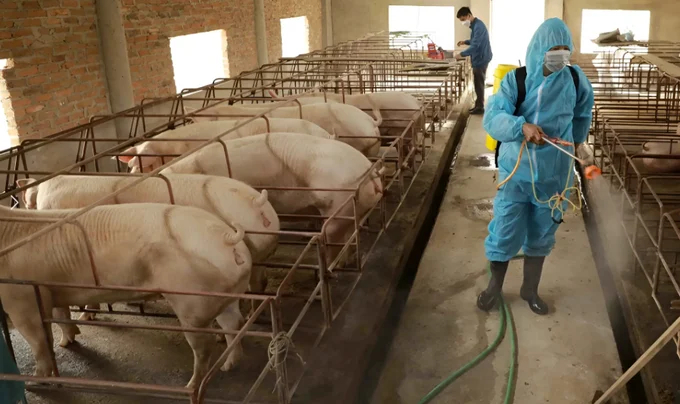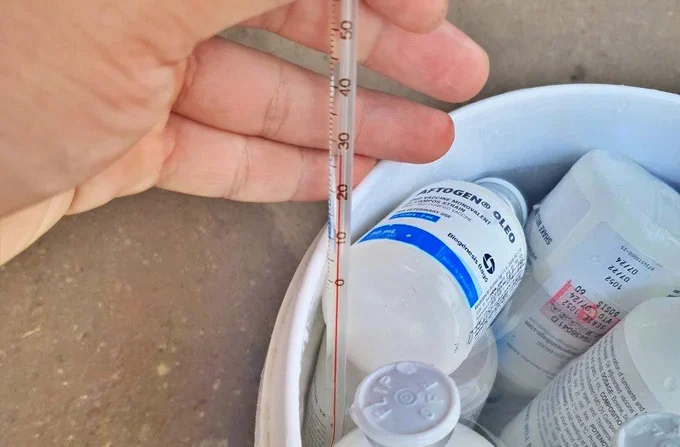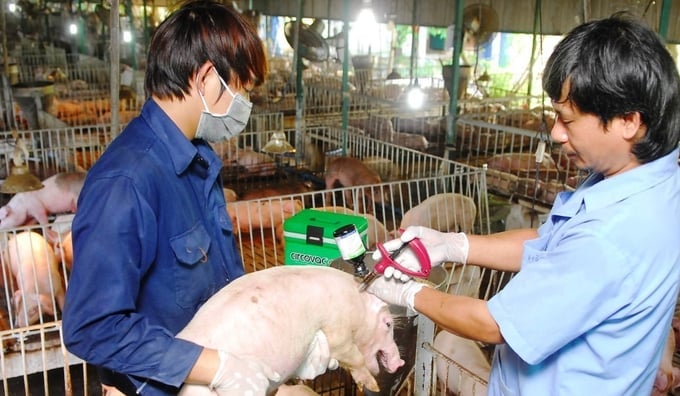May 19, 2025 | 23:42 GMT +7
May 19, 2025 | 23:42 GMT +7
Hotline: 0913.378.918
May 19, 2025 | 23:42 GMT +7
Hotline: 0913.378.918

An important characteristic of the Foot-and-Mouth Disease (FMD) virus is the absence of cross-immunity between its serotypes, necessitating the use of the correct vaccine strain for effective prevention. Photo: PT.
Foot-and-mouth disease is an infectious disease caused by a virus that spreads rapidly and widely, affecting cloven-hoofed animals such as buffaloes, cattle, pigs, and goats. It is characterized by the formation of vesicles on mucous membranes (tongue, gums) and thin-skinned areas.
To completely eradicate FMD, the government issued Decision No. 1632/QD-TTg on October 22, 2020, approving the "National Program for FMD Prevention and Control, 2021-2025."
According to Assoc. Prof. Dr. Nguyen Van Giap, Faculty of Veterinary Medicine, Vietnam National University of Agriculture, the disease is caused by seven serotypes (serotypes O, A, C, Asia 1, SAT1, SAT2, and SAT3). Among them, serotypes O and A are the most commonly circulating ones.
Dr Giap notes that a critical feature of the FMD virus is the lack of cross-immunity between serotypes, making it essential to use the correct vaccine strain for effective disease prevention. Strictly adhering to vaccination regulations, completing the full vaccination schedule, and using vaccines with high antigen content are crucial for controlling this disease.
Historical lessons in FMD control in various localities have demonstrated that success hinges on vaccines. Thanh Hoa province's shift from a passive to an active stance in FMD control by changing vaccines is a prime example of this experience.
In early December 2018, the first outbreak of FMD appeared in Nong Cong district (Thanh Hoa) among pigs and then quickly spread to other areas.
Upon receiving information about the outbreak, Mr. Dang Van Hiep, Chief of the Veterinary Sub-Department (now the Livestock and Veterinary Sub-Department of Thanh Hoa), directly coordinated with local officials to contain and eliminate the disease quickly and effectively.
Epidemiological investigations revealed that the FMD outbreak occurred even among vaccinated cattle and pigs with a vaccine containing an antigen content of 3PD50. Despite vaccination, the disease continued to cause numerous deaths and necessitated the culling of livestock.
Suspecting a new strain or incorrect vaccination techniques, the Thanh Hoa Livestock and Veterinary Sub-Department conducted thorough tests and checked vaccination techniques. The results showed that the outbreak was still caused by the FMD virus type O, and many pig, cattle, and buffalo farms had adhered to proper vaccination protocols, yet outbreaks persisted.
After careful research, consideration, and consultation with experts, the Thanh Hoa Livestock and Veterinary Sub-Department decided to switch from the 3PD50 antigen content FMD vaccine to the 6PD50 Aftogen Oleo vaccine to effectively contain the outbreak in Nong Cong district.

Vaccine for Foot-and-Mouth Disease (FMD) with 6PD50 antigen content capable of protecting against all 4 topotypes. Photo: PT.
Within just 2-3 weeks of using the 6PD50 vaccine, its effectiveness became evident. The spread of the outbreaks slowed, and the FMD outbreaks began to stop. The 6PD50 FMD vaccine not only induces a faster, stronger, and longer-lasting immune response compared to the 3PD50 vaccine, but it also enhances the vaccine's protective efficacy against other virus strains of different topotypes.
Since February 2019, FMD has been well-controlled in Thanh Hoa province, with no new outbreaks, making it one of the few localities to successfully contain and eliminate FMD early nationwide.
A similar story unfolded in Bac Kan. Mr Nguyen Quoc Huy, Deputy Director of the Bac Kan Livestock and Veterinary Sub-Department, recalls that in previous years, low vaccination rates were one of the reasons for the difficulty in eradicating FMD in livestock.
Since 2021, Bac Kan province has implemented a new FMD vaccine, Aftogen Oleo (type O). After vaccination, the Livestock and Veterinary Sub-Department randomly sampled livestock in eight high-risk and previously infected communes.
The results showed that out of 160 vaccinated cattle, 153 samples had protective FMD antibodies, indicating no risk of disease post-vaccination.
Based on this, since 2022, Bac Kan province has used the Aftogen Oleo vaccine for mass vaccination of large livestock. As a result, from 2022 to now, no new FMD outbreaks have been detected, and the disease has been controlled, preventing widespread recurrence and damage to farmers.
Sharing insights from the perspective of an exclusive distributor, Mr. Nguyen Van Bach, Director of Amavet Veterinary Medicine Business Joint Stock Company, emphasizes that for FMD, especially type O, there are many topotypes such as O/SEA/Mya-98, O/Cathay, O/ME-SA/PanAsia, and O/India2001d,e. Thus, effective disease prevention requires a vaccine capable of protecting against all four topotypes.

Rapid and timely vaccination of over 70% of the cattle population is crucial for controlling foot-and-mouth disease (FMD). Photo: PT.
However, not all vaccines possess this capability. Most vaccines can only protect against 1 to 3 of the 4 topotypes. Consequently, vaccinated animals may not achieve the highest level of protection, posing a risk of outbreaks and spread, leading to significant losses.
Fortunately, the Aftogen Oleo O1 Campos vaccine meets the criteria for sterility and safety and can protect against all 4 O topotypes. This capability is one reason why this vaccine currently holds the largest market share in Vietnam.
Drawing from six years of distributing the Aftogen Oleo O1 Campos vaccine, beginning in 2017 when FMD was at its peak, Mr Bach explains that FMD in Vietnam currently involves 4 topotypes. Identifying the specific type causing the disease in an entire province is challenging, as the type affecting livestock today might differ tomorrow.
Therefore, to ensure effective disease control within a province, it is crucial to select a vaccine that can protect against all 4 circulating topotypes. This approach maximizes the vaccine's safety and disease control efficacy.
Mr Nguyen Van Bach, Director of Amavet Veterinary Medicine Business Joint Stock Company, recommends that the Department of Animal Health (under the Ministry of Agriculture and Rural Development) issue clear, transparent guidelines on the protective capabilities of each vaccine. This information will help farmers make informed decisions and choose the most effective vaccine for their livestock.
Translated by Hoang Duy

(VAN) This was the assessment shared by experts at the workshop titled 'Assessing the Role and Potential of Low-Emission Rice Production Systems in Vietnam,' held on the morning of May 19.

(VAN) Cai Rong Port is the fisheries control center of Quang Ninh, helping to monitor fishing vessels, combat IUU fishing, and remove the EC's 'yellow card'.

(VAN) The German Agricultural Society (DLG) explores the possibility of establishing a mechanization service center in Vietnam’s Mekong Delta to support farmers in accessing and utilizing advanced machinery.

(VAN) On May 16, the Department of Water Resources Management, in collaboration with the Food and Agriculture Organization of the United Nations (FAO), held a signing ceremony for the GEF-8 project document.

(VAN) Food safety, mechanization, vocational training, and market opening are key areas of cooperation expected between the Vietnamese Government and the Federal Republic of Germany.

(VAN) Deputy Minister Nguyen Quoc Tri also expressed his hope that Cuba will soon overcome its current challenges, attain food security, and further expand cooperation with Vietnam.

(VAN) The project contributes to enhancing the resilience of communities vulnerable to the impacts of climate change, with a primary focus on local women.